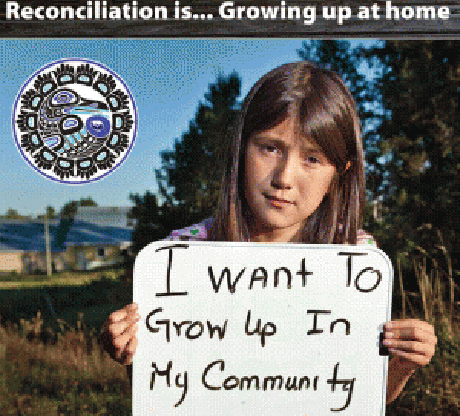Features
You are here
Racism through under-funding: First Nations child welfare services

September 12, 2013
Along with underfunding of health and education for First Nations, the Canadian government severly underfunds child welfare services. The disparity is over twenty per cent and has profoundly negative consequences, and in 2007 a complaint was filed with the Canadian Human Rights Tribunal in 2007.
Child protection agencies that remove indigenous children from their homes do so in the belief that these children are being neglected (vs. physically or sexually abused). "Neglect" is usually the result of extreme poverty, which means parents are less able to provide safe housing, sufficient food or medical attention for their children. These problems are compounded when First Nations child and family services do not have sufficient funding to provide financial and other supports to parents, or to provide prevention programs (like respite care, parenting programs, cultural connections) that would prevent children coming into care.
Once in care, underfunding means that agencies have fewer resources to attract and support alternative caregivers in the communities themselves. This results in the tragic loss of children to their communities, as children in care are placed away from home, often in non-indigenous homes. This break from home and culture has been shown to have particularly negative outcomes in terms of children’s education, mental health, and employment prospects, as well as more run-ins with the legal system. Both the conditions that drive children into care, and the resulting removal of indigenous children from their communities are symptomatic of Canada's continuing colonialism.
The Assembly of First Nations (AFN) and the First Nations Child & Family Caring Society (FNCFCS) filed the complaint. The Society’s Executive Director, Cindy Blackstock is a long-time advocate for the rights of indigenous children. She notes that there are now more indigenous children in care, removed from their families and communities, than at the height of the racist residential school system. Indigenous children make up over half of all children in care in this country.
This case has seen the federal government up to the duplicity it showed with the Truth and Reconciliation Commission—namely the withholding of vital evidence, then releasing massive quantities of data when deadlines are too short for a meaningful review by the complainants. The government tried for years to have the case dismissed altogether, but Tribunal hearings finally got underway in February of this year.
For ongoing coverage of this story visit the FNCFCS website and the Aboriginal Peoples Television Network (APTN), which has been streaming testimony from the Tribunal hearings.
To support FNCFCS, sign up on the website to the “I am a witness” campaign.
Section:










